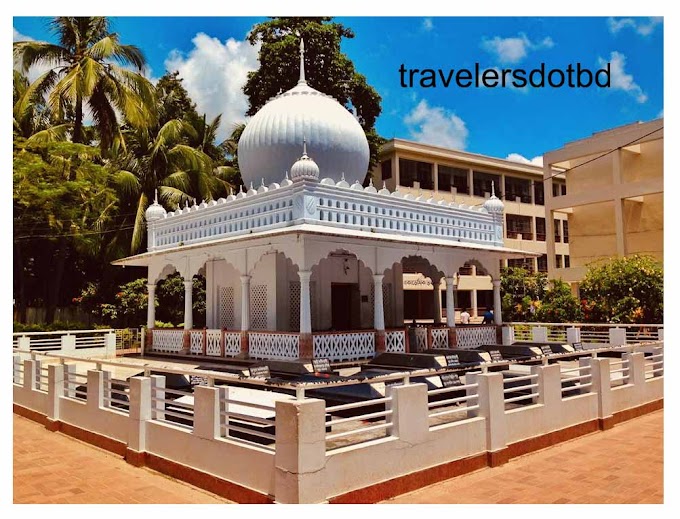Mohini Mill
During the anti-British movement in 1906, small and large mills were set up in the country to use domestic products during the boycott movement, resulting in the Kushtia Mohani Mill.
Chakraborty, a teenager from Elangi village under Kumarkhali police station in Kushtia (then Nadia district), used to work at the Kumarkhali silk factory. While his son Krishnalal was working as a police officer in Boalia, Rajshahi, his son Mohini Mohan passed the entrance examination of Calcutta University from Boalia High School in 1857. His life span was 1839-1922.
When the Kushtia subdivision was established soon after the Blue Rebellion in Bengal, Mohini Mohan took a job as a clerk at the subdivision headquarters. In 1865, when Mohini Mohan was an employee under WW Hunter, the author of the famous book Civilian and the Indian Muslims (1877), the master, seeing his intelligence, advised him to take a magisterial examination. Mohini Mohan passed the examination as usual and became the Deputy Magistrate of Faridpur in 1874-76. After retiring from government service, he set up a textile factory called Chakraborty & Sons, south of Kushtia Bara Railway Station, in 1906. Although it was a shareholder company, it was owned by Chakraborty & Sons Agency. It is revealed that long before the establishment of Mohini Mill, in 1895-96, there was a trading company called Tagore & Company north of Mohini Mill, of which Rabindranath was its shareholder. A weaving school was opened there in 1905. Mohini Mohan, Jagatkishore Chowdhury and Rabindranath are the three shareholders of Mohini Mill established in 1908. In 1912, the company became Kushtia Mohini Mills Limited.
 |
| Mohini Mill |
In the twenties of the last century, the Kushtia Mohini Mill became inflated with its surplus profit capital, and the exploitation of workers under the rule of profit-oriented exploitative society began. In the thirties, the Mohini Mill Sutakal Mazdoor Union was formed to realize the demands of the workers of the Mohini Mill through the efforts of the workers of the Communist Party who were declared illegal in the subcontinent. Shortly afterwards, comrade Raushan Ali, the uncrowned captain and politically initiated labor leader, appeared on the stage of the mill workers' movement.
It is revealed that Mohini Mohan's mother-in-law was in the family of Ramananda Bhowmik of Muragachha in Kumarkhali police station, his mother's name was Bhagwati. Mohini Mohan is one of their six sons and daughters. Satiprasanna, the first of the four sons of Mohini Mohan and Bhavatarini, was rejected for opposing the British. The second son Girija Prasanna was married to Leelamayi, daughter of Jagatkishore Chowdhury of Muktagachha in Mymensingh. The eldest of their five sons was Devi Prasad alias Kanu Babu (1907-67). He lived in a two-storey Mohini Lodge north of the mill. Kanu Babu is his grandson's son. His grandfather died when Kanu Babu was 15 years old (1922). As a result, Kanu Babu became the sole captain of this match. Subir (Dulal Babu), the only child of Kanu Babu and Nirupama Devi, is now deceased, his only son Sudip is said to be working as a journalist in Delhi. During the Indo-Pakistani war of 1965, Chamanlal, one of the non-Bengali partners of the 6 Mills, migrated to India. Kanu Babu was placed under house arrest under the Pakistan Security Act. The government administration took control of the mill. Kanu Babu died under house arrest in 1967. He is buried in Kushtia crematorium.
Mohini Mill's sari, dhoti and American cloth and yarn were in demand in both Bengal. The mill, which started with a few looms, became a medium-sized popular mill, employing thousands of workers and feeding the masses. Services, maternity wards etc. were developed. Kanu Babu used to help many charitable works in the area. He had special contributions in Kushtia College, crematorium and Lalon Akhra. What was enemy property in 1965 was nationalized by the Bangladesh government in 1972 and treated as vested property. Since then, the match has been stalled for a long time (from 01/11/1987) due to various changes of hands. The mill, which once brought excitement to the public life of the area, created an industrial zone, is a lucrative business organization for the employment of people from all walks of life.



0 Comments